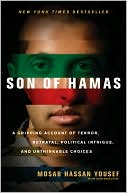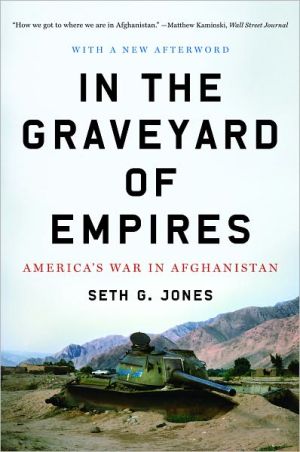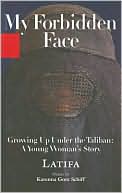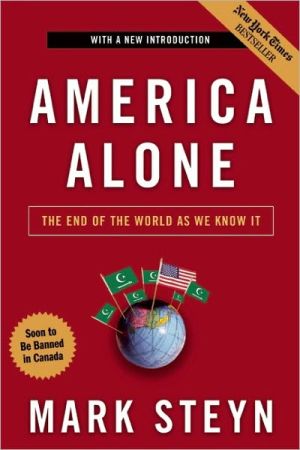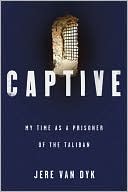A Portrait of Egypt: A Journey through the World of Militant Islam
For centuries Egypt has been a citadel of Islamic learning and thought, and since the signing of the Egyptian-Israeli Peace Treaty in 1979, it has been of immense strategic importance to American interests in the Middle East. But Egypt is also a country in crisis, torn between the old and the new, between unsettled religious revival and secular politics. President Hosni Mubarak favors a secular society. But Mubarak's government faces constant conflict with militant clerics such as Sheikh Omar...
Search in google:
For centuries Egypt has been a citadel of Islamic learning and thought, and since the signing of the Egyptian-Israeli Peace Treaty in 1979, it has been of immense strategic importance to American interests in the Middle East. But Egypt is also a country in crisis, torn between the old and the new, between unsettled religious revival and secular politics. President Hosni Mubarak favors a secular society. But Mubarak's government faces constant conflict with militant clerics such as Sheikh Omar Abdel-Rahman. In A Portrait of Egypt, Mary Anne Weaver argues that an Islamist victory in Egypt is almost inevitable, and, unlike that of Shi'ite Iran, its impact on the Islamic world will be truly profound.Based on exclusive interviews with militants and front men, generals and presidents, A Portrait of Egypt is essential reading for anyone trying to understand the far-reaching consequences of the growing impact of Islamist politics and policies on the West. Theodore Spencer In A Portrait of Egypt, Mary Anne Weaver has a jolting message for everyone who is hoping for peace in the Middle East: Be afraid, be very afraid. Weaver, a staff writer for the New Yorker, makes a clear and convincing case that the inhabitants of the most populous and influential Arab nation will soon topple President Hosni Mubarak's military dictatorship and install an Islamist regime in its place, with a domino-effect potential for the entire Arab world. The fuel for the unrest is less the Koran than the rise of astonishing economic inequality and brutal repression. Since the '70s, Weaver writes, when she was a graduate student at the American University of Cairo, Egypt has lost its complex social and economic layers, becoming a land of haves and have-nots, where the capital city is home both to dealerships doing a brisk trade in $400,000 Mercedes and to slums with, on average, 3.7 people living in every room. One of the surprises in Weaver's book is its portrait of Mubarak -- a man usually pictured in the Western press as a stalwart agent of peace -- as a distant and brutal leader whose regime jails and tortures people without cause and, according to Amnesty International, gives its forces "an official license to kill with impunity." Another is Weaver's ability to get into the Muslim mind and provide a three-dimensional portrait of the Egyptians who believe that Islam is the answer. She shows how Islamists have taken control of the trade unions, the universities, the judiciary, the bureaucracy and the arts -- democratically, and to such an extent that their coming to national power appears to be just a matter of time. "Islam," Weaver observes, "is the world's only major faith that can truly be defined as political." But Islamists wouldn't be on the brink of power today, she notes repeatedly, were it not for three radicalizing events of 1979. The Iranian revolution, the most stunning Islamic political victory in centuries, emboldened Islamists throughout the world with its example of a loosely formed and heavily repressed opposition toppling the Shah. The Camp David accords between Egypt and Israel enraged Egyptian Islamists, who felt that their president, Anwar el-Sadat, had sold out the Palestinians. And the Soviet invasion of Afghanistan led to a war that would not only unify Islamists throughout the world but also provide a U.S.-funded training and networking ground for extremists who would later turn on the United States. The tipping point for Mubarak, Weaver argues, was the November 1997 massacre at Luxor. In that attack, gunmen killed 62 foreign tourists in a 45-minute hail of AK-47 fire and met no resistance from police. The Luxor massacre crippled the Egyptian economy by all but eliminating its primary source of revenue -- tourism -- and suggested that Mubarak was not in control of the country. Thus it is that Egypt finds itself on the verge of following in Iran's footsteps. Weaver's book is assiduously reported and written in an engaging, memoir-like style that puts a human face on people often characterized as fanatics. It includes interviews with all the main Egyptian players, among them Mubarak and Sheik Omar Abdel-Rahman, the spiritual leader of the militant Islamic factions Gama'a and al-Jihad and the mentor of the World Trade Center bombers. There are moments, however, in Weaver's vignette-driven format when she comes across a bit like an older, somewhat naive Nancy Drew. She writes a few too many times of being "struck" by this or that epiphany while walking down the steps from some interview. Overall, though, A Portrait of Egypt is a finely realized book: an image of a nation from an angle we don't often see it from, and one that cannot be ignored. -- Salon
\ From the Publisher"A Portrait of Egypt is a fascinating and thoughtful work that will tell Americans, particularly, facts they didn't know and clarify events they have heard about."—Michael Prager, The Boston Globe\ "A textured and highly readable account of a timely and important subject....What distinguishes Weaver's work is her skill as a reporter and storyteller."—John Lancaster, The Washington Post Book World\ "A compelling narrative of history and personality . . . Weaver understands egypt well."\ —Nicholas Goldberg, Newsday\ \ \ \ \ \ Theodore SpencerIn A Portrait of Egypt, Mary Anne Weaver has a jolting message for everyone who is hoping for peace in the Middle East: Be afraid, be very afraid. Weaver, a staff writer for the New Yorker, makes a clear and convincing case that the inhabitants of the most populous and influential Arab nation will soon topple President Hosni Mubarak's military dictatorship and install an Islamist regime in its place, with a domino-effect potential for the entire Arab world.\ The fuel for the unrest is less the Koran than the rise of astonishing economic inequality and brutal repression. Since the '70s, Weaver writes, when she was a graduate student at the American University of Cairo, Egypt has lost its complex social and economic layers, becoming a land of haves and have-nots, where the capital city is home both to dealerships doing a brisk trade in $400,000 Mercedes and to slums with, on average, 3.7 people living in every room.\ One of the surprises in Weaver's book is its portrait of Mubarak -- a man usually pictured in the Western press as a stalwart agent of peace -- as a distant and brutal leader whose regime jails and tortures people without cause and, according to Amnesty International, gives its forces "an official license to kill with impunity." Another is Weaver's ability to get into the Muslim mind and provide a three-dimensional portrait of the Egyptians who believe that Islam is the answer. She shows how Islamists have taken control of the trade unions, the universities, the judiciary, the bureaucracy and the arts -- democratically, and to such an extent that their coming to national power appears to be just a matter of time. "Islam," Weaver observes, "is the world's only major faith that can truly be defined as political."\ But Islamists wouldn't be on the brink of power today, she notes repeatedly, were it not for three radicalizing events of 1979. The Iranian revolution, the most stunning Islamic political victory in centuries, emboldened Islamists throughout the world with its example of a loosely formed and heavily repressed opposition toppling the Shah. The Camp David accords between Egypt and Israel enraged Egyptian Islamists, who felt that their president, Anwar el-Sadat, had sold out the Palestinians. And the Soviet invasion of Afghanistan led to a war that would not only unify Islamists throughout the world but also provide a U.S.-funded training and networking ground for extremists who would later turn on the United States.\ The tipping point for Mubarak, Weaver argues, was the November 1997 massacre at Luxor. In that attack, gunmen killed 62 foreign tourists in a 45-minute hail of AK-47 fire and met no resistance from police. The Luxor massacre crippled the Egyptian economy by all but eliminating its primary source of revenue -- tourism -- and suggested that Mubarak was not in control of the country. Thus it is that Egypt finds itself on the verge of following in Iran's footsteps.\ Weaver's book is assiduously reported and written in an engaging, memoir-like style that puts a human face on people often characterized as fanatics. It includes interviews with all the main Egyptian players, among them Mubarak and Sheik Omar Abdel-Rahman, the spiritual leader of the militant Islamic factions Gama'a and al-Jihad and the mentor of the World Trade Center bombers. There are moments, however, in Weaver's vignette-driven format when she comes across a bit like an older, somewhat naive Nancy Drew. She writes a few too many times of being "struck" by this or that epiphany while walking down the steps from some interview. Overall, though, A Portrait of Egypt is a finely realized book: an image of a nation from an angle we don't often see it from, and one that cannot be ignored. -- Salon\ \ \ \ Publishers WeeklyWeaver, a New Yorker correspondent, is a gifted writer and observer who has spent a great deal of time and effort trying to understand the complex culture of Egypt and its effects on the entire Islamic world. She conveys the huge gap between Egypt's rich and poor and explains the appeal of political Islam in its many forms (some more radical than others) to the disenfranchised masses. Weaver believes that if Egypt turns "Islamist" in the way that Iran did in 1979, the effects will be much more dramatic throughout the Islamic world. She explains how the new generation of violent Islamic militants active throughout the world is largely the creation of U.S. policy: when the CIA covertly supported the mujahideen who drove the Soviets out of Afghanistan, it armed, trained and funded those who would become the most implacable enemies of the U.S. Weaver excels at explaining how, even as Egyptian president Hosni Mubarak cracks down on domestic Islamic opposition, the mullahs are gaining control of Egypt's judiciary and educational system. Her interviews with Mubarak, Sheik Omar Abdel-Rahman (the spiritual mentor of the World Trade Center bombers and, earlier, of some people involved in the assassination of Anwar Sadat) and Naguib Mahfouz are riveting. Yet, as thorough and eye-opening as Weaver's raw reportage is, the book lacks structure. Organized neither chronologically nor thematically, it is essentially a series of accomplished pieces of journalism that will leave readers with discrete chunks of information and just the hint of a larger pattern that Weaver never quite brings into focus. (Mar.)\ \ \ \ \ Library JournalThis look at Egyptian society and politics has a special focus on the rise of militant Islam in contemporary Egypt. Weaver, a foreign correspondent for The New Yorker, has relied on her interviews with a host of Islamic militants as well as high-level politicians to write an absorbing account of the world of militant Islam. She explains how the anti-Soviet war in Afghanistan galvanized individuals and groups and resulted in the establishment of a network of radical Islamists in Egypt linking kindred spirits from Pakistan to New Jersey. Perhaps the most controversial argument here is Weaver's belief in the high likelihood of an Islamic victory in Egypt, with far-reaching consequences for the rest of the Arab world. This well-written and highly readable book is recommended for those interested in gaining insight into the world of militant Sunni Islam today.--Nader Entessar, Spring Hill Coll., Mobile, AL\ \ \ \ \ BooknewsWeaver is a foreign correspondent for The New Yorker. She was a student at the American University of Cairo in 1977-79, and some of her former classmates and professors are now leaders of the Islamic rebellion against the Egyptian government. She explains why she thinks an Islamist victory in the country is almost inevitable, and why unlike that in Shi'ite Iran, its impact on the Islamic world will be truly profound. No index or bibliography. Annotation c. by Book News, Inc., Portland, Or.\ \ \ \ \ Kirkus ReviewsForget the Arab-Israeli conflict, which, suggests this book, appears almost a sideshow compared to the protracted, bitter intra-Egyptian struggle between secular, pro-Western modernists and fundamentalist Muslims who are battling them to create a state governed by the Shariah (Islamic law). Weaver, who has covered the country for the New Yorker and the Atlantic Monthly, vividly portrays the land where over one out of every three Arabs lives as increasingly out of control, beset by very rapid demographic growth, poverty and unemployment, and a monstrously large, hidebound, and sometimes corrupt bureaucracy. Into this societal breach have stepped a number of fundamentalist, fervently antimodernist Islamic leaders whom Weaver profiles, such as Dr. Abdel-Sabour Shahin, a Shariah scholar. He denounces a colleague who interprets the law significantly more liberally as an apostate, and coolly proclaims to the author, "The prescribed penalty for apostasy is execution." As the November 1997 Luxor massacre revealed, these men and their disciples are willing to use terror against civilians in their efforts to overthrow the 17-year, largely complacent regime of Hosni Mubarak, which ineffectively alternates between appeasing the fundamentalists and brutally cracking down on them. To little avail: fundamentalist Muslims continue to gain influence among university students, the army, the judiciary, the diplomatic corps-and, above all, myriads of poor Egyptians, in part because they have "built a social and welfare system rivaling that of the state." Weaver, who clearly knows Egypt well and apparently is semi-fluent in Arabic (she converses directly with certain figures, though shearrives with a translator for others), has an engaging and sometimes colorful style. She relies almost exclusively on her own interviews and perceptions, unfortunately not integrating other scholarly, journalistic, and fictional accounts of Egypt. Her prognosis is essentially gloomy: the increasingly violent Kulturkampf between secular modernists and fundamentalist Muslims likely will continue, with the latter appearing well on their way to gaining the upper hand. \ \

